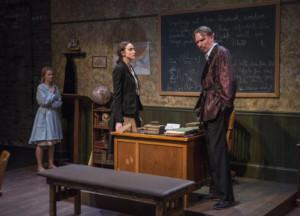Review: HANNAH AND MARTIN at Shattered Globe Theatre

A thought-provoking blend of philosophy, politics, and personal ethics, Kate Fodor's HANNAH AND MARTIN explores the fall-out of one German intellectual's entanglement with the Nazi party. Now playing at Shattered Globe Theatre under the direction of Louis Contey, Fodor's historical drama recreates the love affair between the eponymous characters, German-Jewish political theorist Hannah Arendt (Christina Gorman) and her mentor, philosopher Martin Heidegger (Lawrence Grimm). Following their relationship from Arendt's time as a student in the 1920s, the crux of the play centers around her moral crisis post-World War II, when she must decide whether to help the disgraced Heidegger rebuild a semblance of a career following his long-time support of Hitler's regime.
The action opens in 1946 when expatriate Arendt returns to Germany to cover the Nuremberg trials for The New Yorker. Interspersed with her narration, we see glimpses of the trial of Baldur von Schirach (Drew Schad), who steered a generation of Germans toward Nazi ideology as Reich Youth Leader of the National Socialist German Workers' Party. In his own defense, he claims to have been "only a teacher," upon which Arendt comments, "Very few things are only anything." And therein lies the question of individual culpability in relation to a mass political movement such as Nazism, an issue with which Western societies have grappled throughout the 20th century and beyond.
Flashing back to 1924, we first meet Martin Heidegger through the lens of Arendt's budding relationship, first academic, then personal, with the prominent professor. Lawrence Grimm gives a standout performance as the intense philosopher with a passion for music, art, and literature. In a memorable early scene, Heidegger plays a recording of Richard Wagner's Tristan und Isolde and rhapsodizes not only about the transcendent music but also about the ideas found in the essays of the composer, whom Hitler idolized as well. He enthusiastically agrees with Wagner's wish to "tear it all down and begin again," paving the way for a heroic new age of German culture.
With this ideological foothold established, Heidegger joins the Nazi party shortly after Hitler takes power in 1933. As rector of Freiburg University, he implements anti-Semitic policies in the field of German academia, actions that eventually lead to his conviction by a post-war de-Nazification commission and a ban on his teaching in German universities.
Re-enter Arendt, Heidegger's former friend, lover, and protégée, who has long since fled Germany due to her Jewish roots and involvement in the German Federation of Zionists. In the second act's climactic scene, Arendt visits the shattered scholar at his home, where he and his wife, Elfride (Cortney McKenna), struggle to make ends meet in the wake of his ruined career. Heidegger gives an eloquent defense, not of the Nazis' atrocities, but of the ideals that led him to support the party, insisting that his intention was to promote a "cultural re-shaping" that would make the nation "fertile for thinking and art." Above all, Heidegger emphasizes his sense of personal betrayal by Hitler, claiming that the Nazi leader ultimately went astray but was "very close" to getting it right.
As disconcerting as it may be, Heidegger makes a genuinely compelling appeal. Contey's intimate staging and Grimm's impassioned delivery encourage us, as audience members, to consider the difficult question of what we would do in Arendt's place. Would we help this brilliant, though misguided, man? Of course, his highbrow ideals and love of country in no way justify his support of a monstrous regime. But Fodor's thorough exposition of his motives helps us to understand how an intelligent, well-intentioned person can be seduced by a sinister ideology and/or a manipulative politician. There, but for the grace of historical hindsight, go we?
Shattered Globe Theatre's production of HANNAH AND MARTIN plays through May 25 at Theater Wit, 1229 W. Belmont Avenue, Chicago, IL 60657. Tickets are available at 773-975-8150 or www.theaterwit.org.
Photo credit: Michael Brosilow
Review by Emily McClanathan
Videos
